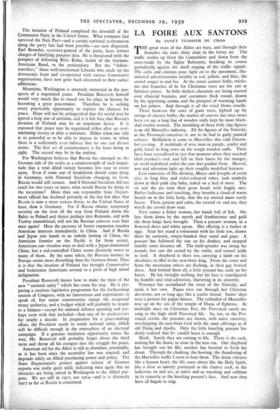LA FOIRE AUX SANTONS
By JANET TEISSIER DU CROS
THE great trees of the Allees are bare, and through their branches the stars shine dear in the frosty air. The traffic rushes up from the Cannebiere and down from the cross-roads by the Eglise Reformee, breaking its course periodically against the shrill ringing of the traffic signals. The cafes and cinemas pour light on to the pavement, illu- minated advertisements twinkle in red, yellow, and blue, the crowd surges to and fro. At the street corners holly, mistle- toe and branches of fir for Christmas trees are for sale at fabulous prices. In little shelters chestnuts are being roasted over charcoal braziers, and customers flock round, drawn by the appetising aroma, and the prospect of warming hands on hot pokers. And through it all the wind blows cruelly.
There between the rows of giant trees, lighted up by strings of electric bulbs, the market of santons has once more been set. up, a long line of wooden stalls kept by stout black- clad market women. The moulding of these little clay figures is an old Marseilles industry. All the figures of the Nativity, as the Provencal conceives it, are to be had in gaily painted colours. Bethlehem is come to Marseilles this cold Decem- ber evening. A multitude of wise men in purple, scarlet and gold, kneel in long rows on the rough wooden stalls. Their faces have crystallised in just that moment when they reached their journey's end, and fell on their knees by the manger, or stood transfixed under the star that guided them. Marvel, awe and adoration light up their roughly modelled features.
Less conscious of His divinity, Marys and Josephs of every size, in long blue and violet-coloured robes, look tenderly down at their pink clay baby, naked on a bed of moss. The ox and the ass turn their great heads with fragile ears. Rather ludicrous and touching, they breathe a cloud of warm breath on to the little body, that the icy mistral must surely freeze. Then, patient and calm, the eternal ox and ass, they watch the crowd draw near.
First comes a fisher woman, her hands full of fish. She lays them down by the myrrh and frankincense and gold the three kings have brought. Then a peasant woman, in a flowered dress and white apron. Her offering is a basket of eggs. Near her stand a townsman with his little son, drawn there by curiosity, empty-handed they stand and gape. A peasant has followed the star on his donkey, and stopped timidly some distance off. The knife-grinder was doing his rounds, but saw the crowd by the stable, and turned aside to look. A shepherd is there too, carrying a lamb on his shoulders, to offer to the new-born king. From the coast and from the mountains others are flocking, in their gay festival dress. And behind them all, a little peasant has sunk on his knees. He has brought nothing, but his face is transfigured by humble and total adoration, shattering in its sincerity. Provence has assimilated the story of the Nativity; and made it her own. Pagan rites ran through her Christian devotions, not so long ago, like a scarlet thread. Saints' days were a pretext for pagan dances. The cathedral of Marseilles rose up on the site of the temple of Diana of Ephesus. At midnight mass on Christmas Eve, the Provencal carols are sung to the high shrill Provencal fife. So, too, in the Pro- vencal creche, the peasants are shown, with naive sincerity, worshipping the new-born God with the same offerings as of old Diana and Apollo. Only the little kneeling peasant has dimly realised that hi-, candid heart is enough.
Hush. Surely they are coming to life. There is the cock, waiting for the dawn, to crow in the new era. One shepherd has brought out his fife, another has hurried to fetch his drum. Through the clanking, the hooting, the thundering of the Marseilles traffic I seem to hear them. The drum vibrates like a human heart, the fife soars above like the Holy Spirit, like a . dove as naively portrayed as the clumsy cock, as the ludicrous ox and ass, as naive and as touching and sublime in its sincerity as the kneeling peasant's face. And now they have all begun to sing.






























 Previous page
Previous page